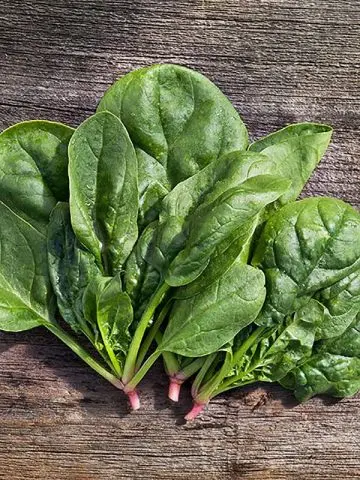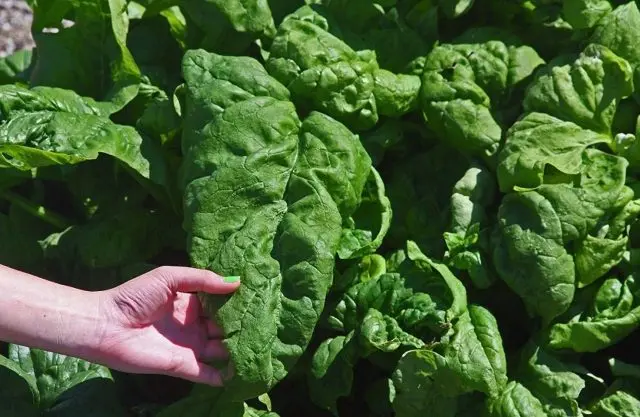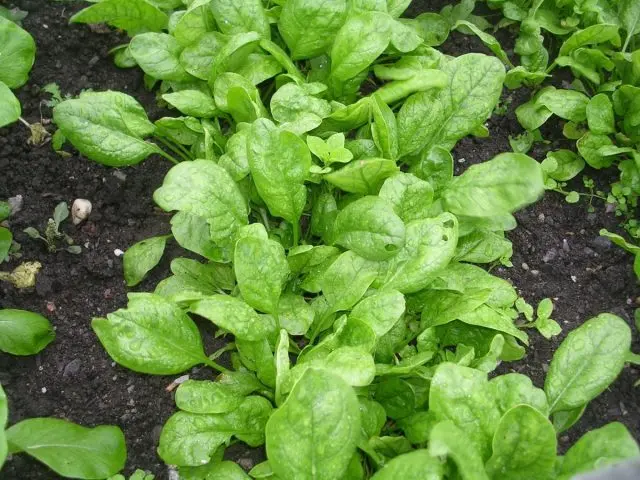Contents
Spinach is an annual herbaceous plant of the Amaranth family. Forms a basal rosette of leaves. Plants are male and female. The foliage of males is less, only females provide planting material. The culture is represented by several varieties, the plant is bred only generatively. Growing Matador from spinach seeds is possible by direct planting in the ground before winter or early spring.

Description of Spinach Matador
In cooking, young large leaves of the culture are used. The plant is versatile in use. Spinach Matador is a cold-resistant variety, the optimum temperature for vegetation is 16-19 0C. Suitable for greenhouse and outdoor cultivation. Matador is one of the few varieties that can be grown indoors on a windowsill.
Spinach Matador is a mid-ripening variety, the leaves ripen 1,5 months after the appearance of young shoots. Sowing is possible before winter, planting seedlings in early spring or sowing seeds directly on the garden bed. Several crops are harvested per season. Sow seeds at intervals of 14 days.
Matador is not afraid of low temperatures, seeds germinate at +4 0C. If the outlet fell under the snow, the negative factor will not affect the further vegetation.
External characteristic:
- the plant is medium-branched, weighing 55 g, the basal rosette is compact, dense, diameter is 17-20 cm;
- the root system is rod, deepened by 25 cm;
- leaves are oval, slightly elongated, saturated green with jagged edges, formed on short petioles;
- the surface of the plate is glossy, bumpy, with pronounced veins.
The yield of spinach Matador is high, with 1 m2 collect 2-2,5 kg of fresh herbs. They use the culture in the form of salads, the leaves do not lose their taste and chemical composition when cooked.
Features of growing spinach Matador
Spinach Matador is a cold-resistant plant if the air temperature exceeds +19 0C, the culture begins to form an arrow, the leaves become stiff, the composition deteriorates significantly. Provokes shooting for a long time of illumination. If the plant is grown in a greenhouse, it is recommended to take care of shading.
Spinach Matador grows well in cultivated, humus-rich, neutral soil. The root system is weak, for better oxygen supply, the soil should be light, the top layer loose, a prerequisite is the absence of weeds. Absolutely does not tolerate the north wind, the culture is planted behind the wall of the building on the south side.
Planting and Caring for Spinach Matador
Matador is grown in greenhouses, in an open garden, in a container on a windowsill or balcony. You can sow seeds in a container and grow on a covered loggia all winter, after taking care of heating. Matador spinach seeds are sown in late autumn in a greenhouse, in regions with a warm climate – in an open area. Approximately landing work is carried out in the middle or end of October. If the greenhouse structure is heated, the greens can be cut all year round. For early production of leaves, the variety is bred in seedlings. Sowing for seedlings is carried out in early March.

Site preparation
A place for spinach is dug up in the fall and the necessary trace elements are added. A prerequisite for acidic soils is its neutralization, without taking measures, the culture will not give a sufficient amount of green mass. Site preparation:
- before digging, peat is laid out on the bed at the rate of 5 kg / m2;
- instead of peat, you can use compost in the same proportion;
- scatter on the surface of the seat a mixture consisting of superphosphate, nitrophoska, potassium sulfate and dolomite flour (if necessary) with the calculation of 1 tbsp. l of each product per 1m2;
- then the site is dug up, left for the winter;
- in the spring, the bed is loosened and urea, nitrogen and phosphorus agents are added.
Seed preparation
Planting material for spinach Matador is in a hard pericarp. The shell protects the seeds from frost while at the same time inhibits their germination. To speed up the process, the seeds are prepared for planting in advance:
- Prepare a solution of the stimulant “Agricola Aqua” at the rate of 1 tbsp. spoon for 1 liter of water.
- Heat liquid up to +40 0C, seeds are placed in it for 48 hours.
- Then a napkin is spread out and the planting material is dried.
Rules of landing
The Matador spinach bed is raised by about 15 cm. The sequence of planting work:
- Make parallel strips for the length of the entire landing area.
- Furrow spacing – 20 cm
- Deepen the seeds by 2 cm.
- Fall asleep with soil, water with organic matter.
After 2 weeks, the first growth will appear, after the formation of a rosette of 3 leaves, the plant dives. Thin out so that at least 15 cm remain between the bushes. Spinach does not tolerate dense planting.
Watering and top dressing
From the moment of germination to shooting, spinach Matador is watered under the root regularly. Only organic matter is applied as top dressing, because the leaves of the plant quickly accumulate chemicals in the soil. For top dressing, Lignohumate, Effekton O, Agricola Vegeta are used. Fertilization time is at the beginning and end of June.
Weeding and loosening
Weeding between rows is carried out immediately after determining the rows. Weeds must not be allowed to grow. They are a favorable environment for the development of a fungal infection. Removal of weeds between the mustaches of spinach is carried out manually so as not to damage the root of the plant. After the formation of a rosette of 4 leaves, the spinach is spudded with a small amount of soil. The event helps to retain moisture and prevent the soil from drying out. Loosening is carried out as needed. At the first sign of the appearance of arrows, they are removed.

Diseases and pests
Spinach Matador is difficult to attribute to varieties with weak immunity. The infection rarely affects the plant. Possible manifestation of powdery mildew. The cause of a fungal infection is the untimely removal of weeds and thickened planting. The use of chemicals is not recommended. Spinach Matador is treated with infusion of garlic or whey. You can help the plant only at the first stage of the development of the infection, if timely measures are not taken, the affected plant is removed from the garden along with the root.
With improper agricultural practices, untimely loosening of the soil and dense, unthinned plantings, spinach may be affected by root rot. If it was not possible to prevent the disease, it is not possible to cure the culture and save it from death.
The main pests of spinach Matador are aphids and slugs. From aphids use:
- soap solution – 100 g of laundry soap per 2 liters of water;
- tincture of wormwood – 100 g of crushed plant, brew 1 liter of boiling water, insist 4 hours;
- infusion of wood ash – 300 g of ash is poured into 5 liters of boiling water, insisted for 4 hours, after sedimentation, the plants are treated with an upper light layer of water.
Slugs appear during the rainy season and feed on leaves. They are harvested by hand or set in the garden with special traps.
Harvesting
Spinach harvest Matador begins 2 months after planting the seeds in the ground and 1,5 months after the appearance of young shoots of autumn sowing. Spinach forms a rosette of 6-8 juicy, large leaves. It is impossible to allow the plant to begin laying flower stalks. By this time, spinach is considered overripe, the leaves become rough, lose their juiciness and useful trace elements.
Spinach is harvested by cutting the leaves or together with the root. After harvesting, the plant is stored in the refrigerator for 7 days, then it loses its beneficial properties and taste. The best storage option for spinach is dry freezing. The collection is carried out in dry weather, so that there is no moisture on the leaves; spinach is not washed before freezing and storage.
Reproduction
Spinach Matador is male and female. One seed gives two sprouts, after the formation of two leaves, a weak sprout is removed. The female plant gives more green mass, the rosette and leaves are larger. The strongest plant of the entire planting is left on the seeds. Spinach forms an arrow with a peduncle. The plant is dioecious, in the fall you can collect seeds for planting. They are used in the spring. The shelf life of planting material is 3 years. For planting in the fall, it is better to take seeds from last year’s harvest.
Conclusion
Growing Matador from spinach seeds is the best option for breeding a crop. In regions with a mild climate, landing can be carried out before winter in an open area. In temperate climates, autumn sowing is carried out only in a greenhouse. Spinach Matador is a high-yielding, frost-resistant variety, the seeds germinate immediately after the snow melts. Culture of universal purpose, not prone to early formation of arrows.









